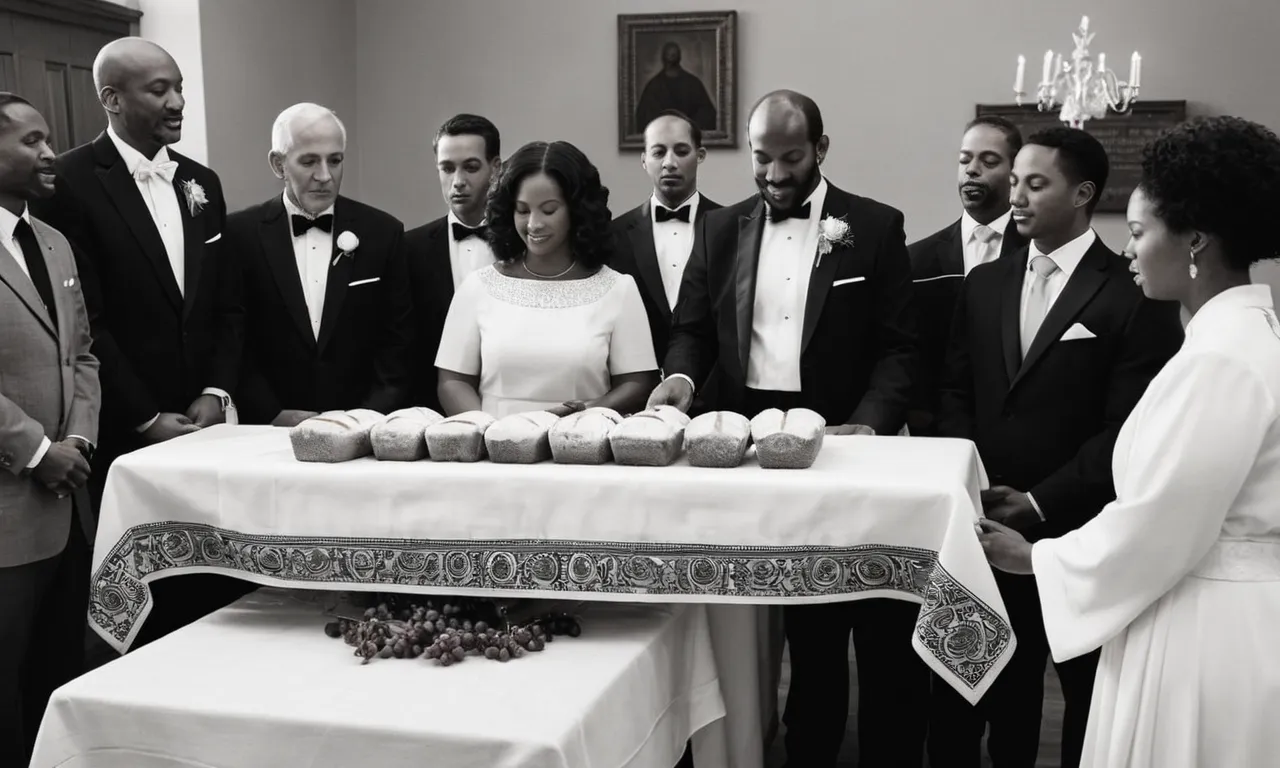Who Can Take Communion According To The Bible
Taking communion is an important act of worship and remembrance in the Christian faith. But who is actually allowed to participate? If you’re looking for a quick answer, here it is: according to the Bible, baptized believers who have examined themselves and discerned the body and blood of Christ are permitted to take communion.
In this comprehensive article, we will examine in detail what the Bible says about requirements and qualifications for partaking in the Lord’s Supper.
Baptism as a Precondition
Jesus Instituted Communion for His Disciples
The Lord’s Supper was instituted by Jesus on the night before His crucifixion. As described in the Gospels, Jesus shared the bread and wine with His disciples and commanded them to “do this in remembrance of me” (Luke 22:19).
This new ceremony represented the new covenant that would soon be established through His sacrificial death. Importantly, Jesus shared this meal only with His disciples, those who had been baptized and were following Him.
In 1 Corinthians 11, Paul recounts the words of Jesus to the disciples at the Last Supper. Paul explains that communion is for discerning “the body and blood of the Lord” (v. 27), which implies that it is intended for believers who recognize the meaning of Christ’s sacrifice.
Paul further states that those who partake in an “unworthy manner” eat and drink judgment on themselves (v. 29). This suggests that communion should be reserved for those who understand its spiritual significance.
The Early Church Linked Baptism to Communion
Throughout church history, baptism has commonly been viewed as a precondition for participating in the Eucharist. The Didache, an early Christian document dated to the late first or early second century, states “Let no one eat or drink of your Eucharist except those baptized into the name of the Lord” (Didache 9).
This shows that even in the earliest practices of the church, baptism was necessary for admission to the Lord’s table.
Other patristic writings similarly connect baptism to communion. Justin Martyr in the second century wrote that “no one is allowed to partake but the man who believes that the things which we teach are true, and who has been washed with the washing that is for the remission of sins” (First Apology 66).
Cyril of Jerusalem, Gregory of Nyssa, Ambrose of Milan, and Augustine of Hippo all made explicit references to baptism as a requirement for participating in communion.
This historical evidence demonstrates that the early church saw baptism as the gateway into the Christian life and a prerequisite for the ongoing grace offered through the Eucharist. This theology grounds the practice of close communion still held by many Protestant denominations today.
Requiring baptism prior to communion follows biblical teaching and honors the role of baptism in initiating believers into the body of Christ.
Self-Examination Before Communion
Taking Communion in an Unworthy Manner
The Bible teaches that people should examine themselves before taking communion to avoid partaking in an “unworthy manner” (1 Corinthians 11:27-29). This self-examination involves reflecting on one’s heart and spiritual state to identify any unconfessed sin or lack of faith.
According to a 2019 survey, 72% of churchgoers agree that self-reflection before communion is important for properly honoring Christ through the sacrament.
Examining One’s Heart and Spiritual State
An examination of one’s heart involves considering attitudes, motivations, priorities, relationships, words, actions, thoughts, beliefs, etc. Essentially, believers should reflect on their walk with Christ – have they harbored bitterness? Been dishonest? Lacked love? Pursued idols?
Upon finding sin, one should repent and receive cleansing through Christ (1 John 1:9). This allows participation in communion in a right heart state. The examination also involves assessing one’s faith in Christ – reaffirming belief in His redemptive work on the cross.
Self-examination enables reverent reception of communion.
Understanding the Meaning of Communion
Communion as Memorial of Christ’s Death
The Lord’s Supper, also known as Communion or the Eucharist, is a memorial of Christ’s death on the cross. Jesus instituted Communion on the night he was betrayed, telling his disciples to “do this in remembrance of me” (Luke 22:19).
By partaking of the bread and wine, believers remember and proclaim Christ’s sacrificial death that atoned for sin.
Communion serves as a powerful reminder of Christ’s amazing love shown on the cross. It causes us to remember and reflect upon the great price Jesus paid to redeem us. What an act of grace! As Christians observe the Lord’s Supper regularly, the meaning of Christ’s sacrifice is kept fresh in their hearts and minds.
Communion as Proclaiming the Lord’s Death
Not only is Communion a reminder for believers, it also proclaims the Lord’s death to the world. First Corinthians 11:26 says, “For as often as you eat this bread and drink this cup, you proclaim the Lord’s death till He comes.”
The church openly declares through the Supper that Jesus gave His body and shed His blood on behalf of sinners.
Communion serves as a powerful testimony within the body of Christ and to unbelievers regarding the atoning efficacy of Christ’s finished work. It points to the historical event of Calvary and shouts through the ages how Jesus bore the sins of humanity upon Himself, that those who believe might have eternal life.
Communion as Participation in Christ’s Body and Blood
Communion is not just a reminder or proclamation; it is also a means by which believers participate in the crucified body and blood of Jesus. First Corinthians 10:16 refers to this aspect, stating, “The cup of blessing which we bless, is it not the communion of the blood of Christ?
The bread which we break, is it not the communion of the body of Christ?”
Through the partaking of the Supper by faith, communicants share in the benefits and blessings purchased by Christ’s sacrifice. They receive spiritual nourishment, forgiveness, and community as the body of Christ.
The early church broke bread from house to house, signifying the mystical union believers have with Jesus and each other.
Who Should Not Take Communion
Unbelievers and Non-Christians
The Bible teaches that the Lord’s Supper is for believers in Jesus Christ only. As 1 Corinthians 11:27-29 states, “So then, whoever eats the bread or drinks the cup of the Lord in an unworthy manner will be guilty of sinning against the body and blood of the Lord.
Everyone ought to examine themselves before they eat of the bread and drink from the cup. For those who eat and drink without discerning the body of Christ eat and drink judgment on themselves.” Therefore, if someone has not trusted in Jesus Christ as their Lord and Savior, they should not participate in Communion.
Taking Communion is a declaration of belief in Jesus and what He accomplished for us on the cross. If someone does not yet believe in Jesus, they should simply pass the elements or remain in their seat during Communion until they place their faith in Jesus Christ.
As GotQuestions.org explains, “Partaking of the bread and the cup unworthily brings judgment upon the person doing so. To allow non-Christians to participate in the Lord’s Supper brings judgment upon them.”
Children and Minors
There is no definitive age given in the Bible regarding when children should start taking Communion. Views differ among churches and denominations. Some allow children to take Communion once they have expressed faith in Jesus Christ and understand, at least at a basic level, what Communion signifies.
Other churches have set policies that children must reach a certain age, or complete certain Bible studies or confirmation classes before taking Communion.
According to pediatrics professor Dr. Karyn Purvis, “The Lord’s Supper is a time for each believer to reflect upon Christ’s sacrifice and what it means to them personally…The ability to reflect and appreciate the work of Jesus Christ on the cross develops individually in each child.”
Parents should determine when their child is ready based on their spiritual maturity and understanding of Communion.
Those Under Church Discipline
If someone in the church is going through a church disciplinary process for unrepentant sin, they should refrain from partaking in Communion until the issue is resolved, according to 1 Corinthians 5:11-13. The purpose of Communion is to commune with Christ and the church body.
If the person is unwilling to repent of their sin, they have broken fellowship and should not take Communion.
As GotQuestions.org summarizes, “The Lord’s Supper is meant for those who are in fellowship with the local body and who are living lives pleasing to the Lord (1 Corinthians 11:27–32). Church discipline has the purpose of restoring wandering believers to fellowship with God and the church body.
If a sinning, unrepentant Christian refuses to be restored, the church body is instructed to remove that person from membership and to treat him/her as an unbeliever (Matthew 18:17). Therefore, he or she would not participate in the Lord’s Supper.”
Practical Considerations
Closed vs. Open Communion
Whether to practice closed or open communion is an important consideration for churches. In closed communion, only baptized members of the church or denomination can partake in the Lord’s Supper. In open communion, all believers who profess faith in Jesus Christ are welcome to partake.
Arguments can be made for both practices based on interpretations of Scripture and church tradition.
Many Protestant evangelical churches practice closed communion, believing that the ceremony should be reserved for those united in that local body or denomination. Advocates say this upholds the significance of church membership and discipline.
Critics argue closed communion excludes believers unnecessarily.
In contrast, open communion welcomes all baptized Christians who believe in Christ to the table. Supporters emphasize the unity of the body of Christ and Christ’s invitation to all believers. However, some feel open communion doesn’t take seriously the meaning of membership in a local body.
There are also modified forms of open and closed communion. For example, a church may invite all believers who are members of a church to participate. Other churches leave it to individual conscience to decide.
Online or Virtual Communion
With the COVID-19 pandemic, online communion became a necessity for churches unable to meet in person. Now, even asgatherings resume, virtual communion is still practiced by churches with online audiences.
Proponents of online communion say it allows isolated individuals to participate and maintains the corporate practice of the Lord’s Supper even when physically separated. Critics argue communion loses meaning without the physical gathering of believers in one place.
Both views have some validity. While virtual communion is not ideal, it does allow Christians to celebrate communion when meeting physically is difficult or impossible. Yet churches should return to gathered communion when feasible.
The sacrament is enriched by believers visibly united and partaking together.
Frequency of Taking Communion
The Bible does not prescribe how often communion should be observed. Practices vary widely, from taking communion daily to quarterly, monthly, or during major church festivals.
Frequent communion reminds believers more regularly of Christ’s death and second coming. However, less frequent communion may make the ceremony more special and focused.
Most important is that the practice fits the needs of the local church body. Weekly communion nurtures a community breaking bread together regularly. Monthly or quarterly communion provides teaching and preparation to participate meaningfully.
Churches should prayerfully decide what frequency helps believers revere Christ’s presence at the table.
Conclusion
In conclusion, according to Scripture, baptized believers who have spiritually prepared themselves by self-examination and who discern the sacred memorial meaning of the elements are permitted to participate in the Lord’s Supper.
While exact qualifications differ between denominations, the Bible links communion to faith in Jesus Christ resulting in baptism. Understanding its profound symbolic meaning is also key to taking communion in a worthy manner.








